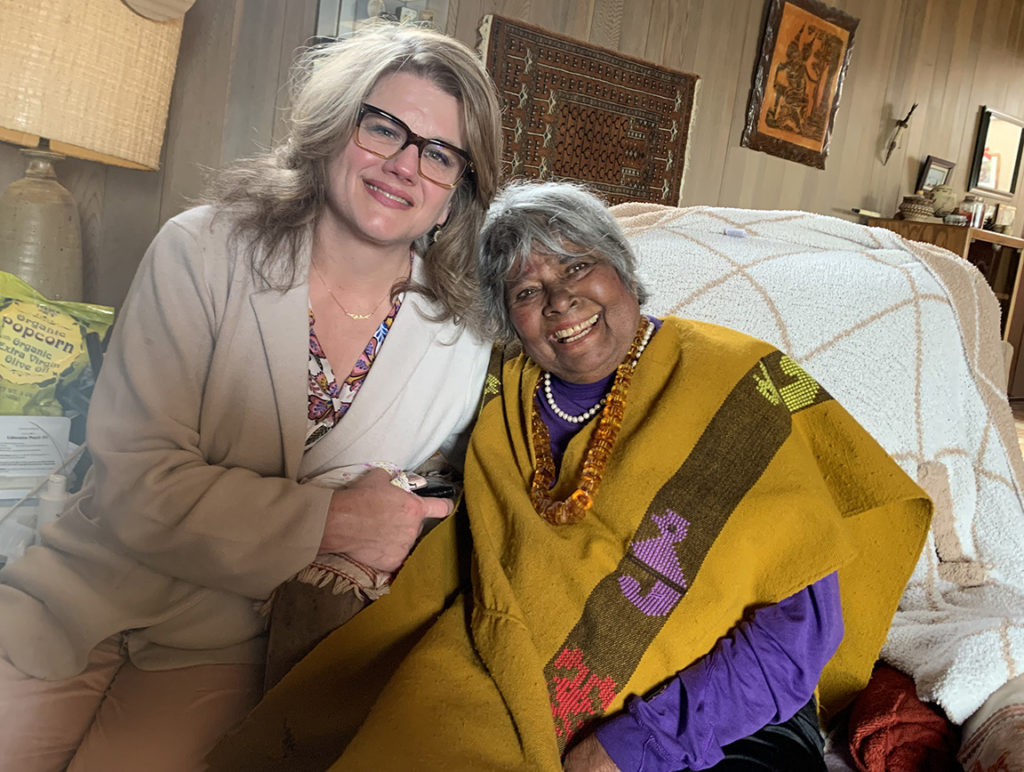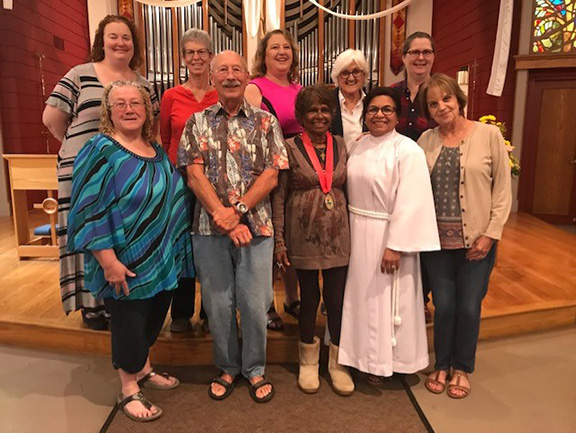
Retired university professor and philanthropist Sarojam “Saroj” Mankau, right, poses with Karri Backer, rector of St. George’s Church, Riverside. Photo: Pat McCaughan
[The Episcopal News] Education means so much to Sarojam “Saroj” Mankau that she has contributed toward building schools in Guinea, Jordan, Sudan and Palestine, and has also funded a scholarship in the graduate nematology department at the University of California at Riverside.
As Mankau, a retired California State University professor of biology and a parishioner at St. George’s Episcopal Church in Riverside, turns 93 this June, family, friends, and beneficiaries of her philanthropy will gather to celebrate the “amazing woman” they know and love.
Growing up in Kerala, at India’s southernmost tip, “philanthropy is in my DNA,” she tells the News. She recalled her father moving the family to a rural village, where he taught agricultural classes, built an orphanage and a senior residence and where their home became a kind of community drop-in center to aid those less fortunate.
After graduating college in India, she opted out of an arranged marriage, moving instead to suburban Chicago “with only $20 in my pocket. I bought my first pair of shoes the day before I left. Here, we think going barefoot means you are deprived,” she said. But in rural India, shoes “were like eyeglasses – you only wore them if you needed them.”
There was a brief, challenging stint as an au pair “with a white supremacist family who tried to civilize me” before she began graduate studies at the University of Illinois, Champaign-Urbana, and met her husband, the late Reinhold “Ron” Mankau.
“What amazes me, in 1951, when I arrived, I expected women to be part of the student body, but I was the only one. That surprised me,” she recalls now. Also shocking was her “international marriage” three years later, for her family, her German in-laws and for colleagues.
She earned a Ph.D. in parasitology, “because she got pinworms when she was five years old and was determined to make that not a problem in the world anymore,” says Kim Ericson, St. George’s senior warden and Mankau’s close friend.

In 2019 the bishop of the Diocese of Guinea presented Saroj Mankau, center front, with a medallion in appreciation of her contribution of more than $100,000 to build a school for girls. Mankau is pictured with then-rector Khushnud Azariah and lay ministry leaders from her parish, St. George’s, Riverside.
Supporting schools and education
Mankau has contributed $100,000 for scholarships and to build the Miriam Malala High School for Muslim girls in Guinea, West Africa. It was named for both her mother, Miriam, and for Malala Yousafzai, the young Pakistani education activist who survived a gunshot wound to the head in a 2012 Taliban assassination attempt because of her determination to go to school.
“I’ve always been interested in Muslim girls’ education, and when Malala came on the scene, I was totally taken by her,” recalls Mankau. “Our diocese had a connection with the bishop there” through the Program Group on Global Partnership.
“It’s a lovely story. She worked closely with the program group for five years,” recalled Troy Elder, executive director of IRIS, the diocese’s Interfaith Refugee and Immigration Service, who has served on the program group.
“Saroj’s generosity and character embody the very best of what it means to “do” global mission: cultural sensitivity, the long view, and a gift for recognizing Christ in the other – here, Muslim girls in West Africa, of course, but also the importance of cultivating long-term relationships of mutuality. I hope others in the Diocese of Los Angeles will accept her invitation to continue the Guinea partnership in new ways moving forward.”
Elder and other program group members have visited the school and are hoping to deepen relationships with the Anglican Diocese of Guinea and with the bishop, the Most Rev. Jacques Boston, who is also the primate of the Internal Province of West Africa in the Church of the Province of West Africa.
Among other things Elder hopes to grow the number of “Friends of Guinea” within the Los Angeles diocese and the wider church, and to consider a formal companion relationship between the two dioceses, as well as developing sister school relationships.
In addition to the Miriam Malala School in Guinea, Ericson lists other beneficiaries of Mankau’s philanthropy, including gifts of $50,000 each to the Holy Land Institute for the Deaf (HLID) in Salt, Jordan, and the Episcopal Technological and Vocational School (ETVTC) in Ramallah in Palestine’s West Bank. Both are ministries of the Diocese of Jerusalem.
Randy Heyn-Lamb, a program group member, said he facilitated the connections between Mankau and the American Friends of the Episcopal Diocese of Jerusalem (AFEDJ), a nonpolitical, nonsectarian, nonprofit organization dedicated to raising financial support for schools, hospitals, and centers for children with disabilities in Palestine, Israel, Jordan, and Lebanon, which serve everyone regardless of faith.
HLID “is an amazing place, not only in terms of concern and care for the children who are their charges, but for their professionalism,” said Heyn-Lamb, in a recent telephone conversation. During a visit, “we saw some girls with an interest in carpentry, cabinetry; and the same for the vocational school. It gives people the practical skills to try to have a meaningful career that is self-sustaining.”
Mankau’s gifts “are going to have a tremendous impact on the lives of students. There are a lot of poverty-stricken parents who send kids to the schools,” he added.
A Nov. 2020 AFEDJ newsletter specifically thanks Mankau, as “her gift of $50,000 to each institution will transform lives for years to come.
“At ETVTC, it will help Giovanni [Anbar, the founder and director] complete the guesthouse renovation and at HLID it will support the full cost of education, boarding, and therapy for five deaf and deaf-blind students.
Former Jerusalem Archbishop Suheil Dawani also wrote: “Your gift will empower students to overcome the many challenges they face in order to become happy and full members of society as they grow into adulthood. “As the result of the pandemic, more families than ever are unable to afford the services they need for their children. We are only able to help these families through the generosity of donors” like Mankau, he said.
Anbar added, “[B]ecause of friends and supporters like Mrs. Mankau who share our vision, we are where we are today!”
Similarly, the Rev. Tom Prichard is executive director of Sudan Sunrise, which works with individuals from diverse religious backgrounds and identities to facilitate a lasting peace. Mankau reached out to him several years ago to aid in building three classrooms each for two different schools in the Diocese of Aweil in southern Sudan.
One project bolstered a school originally built by the Sudanese-born Manute Bol who, at 7-foot-7, was one of the NBA’s tallest players. His dream was “for children of all religions to attend school together,” he said. Bol played for the Washington Bullets and three other teams during his nine-year professional basketball career. He died in 2010.
Prichard said Mankau also felt a special resonance with the organization’s Moringa Project, which plants trees whose fruit pods “are a source of vitamins and minerals and are very helpful in South Sudan where there is so much malnutrition.” Mankau made a donation in memory of her husband after his December 2021 death.
“I grew up with [Moringa trees] in India,” Mankau said. “I have one outside my house now. It has very high protein and most of the children in the world are protein deficient. It makes a huge difference in their lives. My husband was an agricultural scientist in various countries and so I decided to honor his name with the Moringa Project.”
Prichard added: “One of the cool things Saroj likes about this is, it’s very much driven by women. The people who plant are the women and the people who feed their families are the women. Moringa helps moms produce more milk for their children. It’s a good thing. A lot of our families are doing better.”
The fruit pods have also become an invitation to reconciliation, Prichard said. “We ask the women; if we give you extra seeds, will you take them to people of other tribes? Every single woman wanted to do it.” The gift has made it possible for Sudan Sunrise to provide millions of seeds, and increased hope for reconciliation, he said.
An amazing woman
When Mankau taught ecology, “I made it a requirement for students to collect empty beer cans, to impress upon them how much waste is thrown out,” she recalled. “I got $750 worth of aluminum cans – enough to build a house in India for a poor family who didn’t have a home.”
In the 1970s, she taught human sexuality at Cal State San Bernardino. “It was groundbreaking, and somewhat scandalous,” Ericson said. “Sometimes she and Ron would have dinners at their home to address the more controversial things. She started dealing with LGBTQ+ issues and it was quite controversial.”
Mankau also “ran a marathon at age 80, and finished it,” Ericson said. Although exceedingly generous philanthropically, she lives very frugally, she added. “When she was about 86, she was having difficulty hanging her laundry out on the line and I had a discussion with her about buying a dryer. She had plenty of money to buy a dryer, but she thought buying one was wasteful.”
According to Ericson, the Mankaus visited and worked on every continent, and fell in love with Baja, California, where they built a basic home. “I cooked over an open fire there every day,” Mankau said.
Ericson added: “She adopted an orphanage down there and would go and take school supplies to the kids, and work with them.”
Friends are eager to celebrate Mankau, who suffers from congestive heart failure, Ericson said. “She was the only female in a biology department at UCR and Cal State San Bernardino. She had to fight for everything and that’s part of why she has focused on girls who don’t have the opportunity, on finding ways to give them the opportunity to get an education.”
Mankau cited the Anglican kindergarten school she attended as one source of her inspiration. “They gave me a real boost for the rest of my education. I felt special. I tried harder. I was always competitive anyway.”
Her party is slated for June 16; details are pending. According to the Rev. Karri Backer, rector of St. George’s, Riverside, Mankau has requested that the celebration focus on Christian-Muslim relationships.
The Episcopal News’ “Voices of Justice” series highlights the vocations of Episcopalians who are effecting positive community change.
